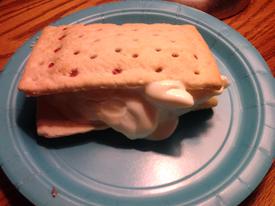257 Names for Hidden Sugar

alikatu
Posts: 32 Member
I do not take credit for the following. Please see: https://www.facebook.com/notes/single-mans-kitchen/all-the-249-names-of-sugar-so-far-project/10150839799498198
All the 257 names of sugar so far project.
by Single Man's Kitchen on Friday, May 18, 2012 at 7:55am ·
I have moved this to the top of the notes, as it is an important project and was getting buried.This is the list of the ingredient names for sugars that you find on packages in the USA and Canada. Some of the sugars are really artificial sweeteners, but have a high calorific value, high enough to be considered an artificial sugar. Anyone can suggest an addition or removal from the list and all comments and questions are welcomed. If I don't know the answer, it forces me to learn.
Agave nectar (Often with HFCS)
Agave syrup (Often with HFCS
All natural evaporated cane juice
Amasake
Amber liquid sugar
Anhydrous dextrose
Apple butter
Apple sugar
Apple syrup
Arenga sugar
Bakers special sugar
Barbados Sugar
Barley malt
Barley malt syrup
Bar sugar
Berry Sugar
Beet molasses
Beet sugar
Beet syrup
Blackstrap molasses
Blonde coconut sugar
Brown rice syrup
Brown sugar
Buttered syrup
Candy floss
Cane crystals
Cane juice
Cane juice crystals
Cane juice powder
Cane sugar
Caramel
Carob syrup
Caster sugar
Castorsugar
Cellobiose
Chicory (HFCS)
Coarse sugar
Coconut palm sugar
Coconut sap sugar
Coconut sugar
Coconut syrup
Coco sugar
Coco sap sugar
Concentrate juice (Often with HFCS)
Concord grape juice concentrate
Confectioner’s sugar
Corn sugar (HFCS)
Corn syrup (HFCS)
Corn syrup solids (HFCS)
Corn sweetener (HFCS)
Cornsweet 90 ® (really HFCS 90)
Creamed honey (Often with HFCS)
Crystal dextrose
Crystalline fructose
Crystallized organic cane juice
D-arabino-hexulose
Dark brown sugar
Dark molasses
Date sugar
Decorating sugar
Dehydrated sugar cane juice
Demerara Sugar
Dextrin
Dextran
Dextrose
D-fructose
D-fructofuranose
Diastatic malt
Diatase
Disaccharide
Dixie crystals
D-mannose
Dried evaporated organic cane juice
D-xylose
ECJ
Evaporated organic cane juice
Evaporated corn sweetener (HFCS)
Ethyl maltol
First molasses
Florida Crystals
Free Flowing
Free flowing brown sugar
Fructamyl
Fructose (HFCS)
Fructose crystals (HFCS)
Fructose sweetener (HFCS)
Fruit fructose (HFCS)
Fruit juice (Often with HFCS)
Fruit juice concentrate (Often with HFCS)
Fruit sugar (Often with HFCS)
Fruit syrup (Often with HFCS)
Galactose
Glucodry
Glucomalt
Glucoplus
Glucose
Glucose-fructose syrup (HFCS)
Glucose solids
Glucosweet
Gluctose fructose (HFCS)
Golden molasses
Golden sugar
Golden syrup
Gomme syrup
Granulated fructose
Granulated sugar
Granulated sugar cane juice
Grape sugar
Grape juice concentrate
Gur
HFCS
HFCS 42
HFCS 55
High dextrose glucose syrup
High-fructose corn syrup
High fructose maize syrup (HFCS)
High maltose corn syrup (Often with HFCS)
Hydrogenated starch
Hydrogenated starch hydrosylate
Hydrolyzed corn starch
Honey
Honey comb
Honey powder
HSH
Icing sugar
Inulin (HFCS)
Invert sugar
Inverted sugar syrup
Invert syrup
Icing sugar
Isoglucose (HFCS)
Isomalt
Isomaltotriose
Isosweet
Jaggery
Jaggery powder
Lactitol
Lactose
Levulose
Lesys
Light brown sugar
Light molasses
Liquid dextrose
Liquid fructose (Often with HFCS)
Liquid fructose syrup (Often with HFCS)
Liquid honey
Liquid maltodextrin
Liquid sucrose
Liquid sugar
Maize syrup (HFCS)
Maldex
Maldexel
Malt
Malted barley syrup
Malted corn syrup
Malted corn and barley syrup
Malted barley
Maltitol
Maltitol syrup
Malitsorb
Maltisweet
Maltodextrin
Maltose
Maltotriitol
Maltotriose
Maltotriulose
Malt syrup
Mannitol
Maple Sugar
Maple syrup
Meritose
Meritab 700
Misri
Mizuame
Molasses
Monosaccharide
Muscovado sugar
Mycose
Mylose
Nigerotriose
Oligosaccharride
Organic agave syrup
Organic brown rice syrup
Organic cane juice crystals
Organic coconut palm sugar
Organic palm sugar
Organic sucanat
Organic sugar
Organic raw sugar
Orgeat syrup
Palm sugar
Palm syrup
Panela
Pancake syrup
Panocha
Pearl sugar
Piloncillo
Potato maltodextrine
Powdered sugar
Promitor
Pure cane syrup
Pure sugar spun
Raisin syrup
Rapadura
Raw agave syrup
Raw sugar
Raffinose
Refiner’s syrup
Rice maltodextrine
Rice Syrup
Rice syrup solids
Raw honey
Rock sugar
Saccharose
Sanding sugar
Second molasses
Shakar
Simple syrup
Sirodex
Soluble corn fiber
Sorbitol
Sorbitol syrup
Sorghum
Sorghum molasses
Sorghum syrup
Sucanat
Sucre de canne naturel
Sucrose
Sucrosweet
Sugar
Sugar beet syrup
Sugar beet crystals
Sugar cane juice
Sugar cane natural
Sugar hat
Sulfured molasses
Sweetened condensed milk
Sweet sorghum syrup
Syrup Syrup
Table sugar
Tagatose
Treacle
Trehalose
Tremalose
Trimoline
Triose
Trisaccharides
Turbinado sugar
Unrefined sugar
Unsulphured molasses
White crystal sugar
White grape juice concentrate
White refined sugar
White sugar
Wood sugar
Xylose
Yellow sugar
Copyright 2011, 2012 Jeremy Goodwin.
All the 257 names of sugar so far project.
by Single Man's Kitchen on Friday, May 18, 2012 at 7:55am ·
I have moved this to the top of the notes, as it is an important project and was getting buried.This is the list of the ingredient names for sugars that you find on packages in the USA and Canada. Some of the sugars are really artificial sweeteners, but have a high calorific value, high enough to be considered an artificial sugar. Anyone can suggest an addition or removal from the list and all comments and questions are welcomed. If I don't know the answer, it forces me to learn.
Agave nectar (Often with HFCS)
Agave syrup (Often with HFCS
All natural evaporated cane juice
Amasake
Amber liquid sugar
Anhydrous dextrose
Apple butter
Apple sugar
Apple syrup
Arenga sugar
Bakers special sugar
Barbados Sugar
Barley malt
Barley malt syrup
Bar sugar
Berry Sugar
Beet molasses
Beet sugar
Beet syrup
Blackstrap molasses
Blonde coconut sugar
Brown rice syrup
Brown sugar
Buttered syrup
Candy floss
Cane crystals
Cane juice
Cane juice crystals
Cane juice powder
Cane sugar
Caramel
Carob syrup
Caster sugar
Castorsugar
Cellobiose
Chicory (HFCS)
Coarse sugar
Coconut palm sugar
Coconut sap sugar
Coconut sugar
Coconut syrup
Coco sugar
Coco sap sugar
Concentrate juice (Often with HFCS)
Concord grape juice concentrate
Confectioner’s sugar
Corn sugar (HFCS)
Corn syrup (HFCS)
Corn syrup solids (HFCS)
Corn sweetener (HFCS)
Cornsweet 90 ® (really HFCS 90)
Creamed honey (Often with HFCS)
Crystal dextrose
Crystalline fructose
Crystallized organic cane juice
D-arabino-hexulose
Dark brown sugar
Dark molasses
Date sugar
Decorating sugar
Dehydrated sugar cane juice
Demerara Sugar
Dextrin
Dextran
Dextrose
D-fructose
D-fructofuranose
Diastatic malt
Diatase
Disaccharide
Dixie crystals
D-mannose
Dried evaporated organic cane juice
D-xylose
ECJ
Evaporated organic cane juice
Evaporated corn sweetener (HFCS)
Ethyl maltol
First molasses
Florida Crystals
Free Flowing
Free flowing brown sugar
Fructamyl
Fructose (HFCS)
Fructose crystals (HFCS)
Fructose sweetener (HFCS)
Fruit fructose (HFCS)
Fruit juice (Often with HFCS)
Fruit juice concentrate (Often with HFCS)
Fruit sugar (Often with HFCS)
Fruit syrup (Often with HFCS)
Galactose
Glucodry
Glucomalt
Glucoplus
Glucose
Glucose-fructose syrup (HFCS)
Glucose solids
Glucosweet
Gluctose fructose (HFCS)
Golden molasses
Golden sugar
Golden syrup
Gomme syrup
Granulated fructose
Granulated sugar
Granulated sugar cane juice
Grape sugar
Grape juice concentrate
Gur
HFCS
HFCS 42
HFCS 55
High dextrose glucose syrup
High-fructose corn syrup
High fructose maize syrup (HFCS)
High maltose corn syrup (Often with HFCS)
Hydrogenated starch
Hydrogenated starch hydrosylate
Hydrolyzed corn starch
Honey
Honey comb
Honey powder
HSH
Icing sugar
Inulin (HFCS)
Invert sugar
Inverted sugar syrup
Invert syrup
Icing sugar
Isoglucose (HFCS)
Isomalt
Isomaltotriose
Isosweet
Jaggery
Jaggery powder
Lactitol
Lactose
Levulose
Lesys
Light brown sugar
Light molasses
Liquid dextrose
Liquid fructose (Often with HFCS)
Liquid fructose syrup (Often with HFCS)
Liquid honey
Liquid maltodextrin
Liquid sucrose
Liquid sugar
Maize syrup (HFCS)
Maldex
Maldexel
Malt
Malted barley syrup
Malted corn syrup
Malted corn and barley syrup
Malted barley
Maltitol
Maltitol syrup
Malitsorb
Maltisweet
Maltodextrin
Maltose
Maltotriitol
Maltotriose
Maltotriulose
Malt syrup
Mannitol
Maple Sugar
Maple syrup
Meritose
Meritab 700
Misri
Mizuame
Molasses
Monosaccharide
Muscovado sugar
Mycose
Mylose
Nigerotriose
Oligosaccharride
Organic agave syrup
Organic brown rice syrup
Organic cane juice crystals
Organic coconut palm sugar
Organic palm sugar
Organic sucanat
Organic sugar
Organic raw sugar
Orgeat syrup
Palm sugar
Palm syrup
Panela
Pancake syrup
Panocha
Pearl sugar
Piloncillo
Potato maltodextrine
Powdered sugar
Promitor
Pure cane syrup
Pure sugar spun
Raisin syrup
Rapadura
Raw agave syrup
Raw sugar
Raffinose
Refiner’s syrup
Rice maltodextrine
Rice Syrup
Rice syrup solids
Raw honey
Rock sugar
Saccharose
Sanding sugar
Second molasses
Shakar
Simple syrup
Sirodex
Soluble corn fiber
Sorbitol
Sorbitol syrup
Sorghum
Sorghum molasses
Sorghum syrup
Sucanat
Sucre de canne naturel
Sucrose
Sucrosweet
Sugar
Sugar beet syrup
Sugar beet crystals
Sugar cane juice
Sugar cane natural
Sugar hat
Sulfured molasses
Sweetened condensed milk
Sweet sorghum syrup
Syrup Syrup
Table sugar
Tagatose
Treacle
Trehalose
Tremalose
Trimoline
Triose
Trisaccharides
Turbinado sugar
Unrefined sugar
Unsulphured molasses
White crystal sugar
White grape juice concentrate
White refined sugar
White sugar
Wood sugar
Xylose
Yellow sugar
Copyright 2011, 2012 Jeremy Goodwin.
0
Replies
-
And all takes great on my corn flakes. Sugar is not evil.0
-
 I stopped reading once I saw the "Please see: https://www.facebook.com/" line. 0
I stopped reading once I saw the "Please see: https://www.facebook.com/" line. 0 -
Yep, sugar is a good energy source.
A.C.E. Certified Personal and Group Fitness Trainer
IDEA Fitness member
Kickboxing Certified Instructor
Been in fitness for 28+ years and have studied kinesiology and nutrition0 -
I thought inulin was a fiber or something...
And it's not hidden if it says SUGAR in it's name...0 -
I love sugar. It's my favourite!0
-
bump!0
-
Is that it? :laugh:0
-
How about "fudge"? I like fudge.0
-
sugar sugar...doot doot doot dooooo0
-
but have a high calorific value
And that is why tracking calories is a good thing when trying to lose weight.0 -
Conveniently, total sugar is required to be listed on nutritional labels, and all sugar shows up as sugar on the label.0
-
And all takes great on my corn flakes. Sugar is not evil.
Adding sugar is the only correct way to eat corn flakes. :bigsmile:0 -
inulin, isomalt, maltitol, maltitol syrup, mannitol, Oligosaccharride,
sorbitol, sorbitol syrup
None of these are sugars. Sugar substitutes with low GI indexes (maltitol syrup being the highest), yes, but not sugars. Inulin is a sweet-tasting fiber bulking agent.
I agree-- not ALL sugars are bad. That said, a lot of them are.
ETA: most sweeteners ending in the suffix "OL" are sugar alcohols. They are NOT sugar. They taste sweet-- this is really the only thing they have in common with sugar. They are carbohydrates that cannot be broken down by the body at all or are only broken down minimally, thus having no or few calories. They can also include xylitol and erythritol. Most have natural roots (I use xylitol and erythritol in baked goods-- they occur naturally in fruits and are derived from plants-- usually birch trees.)0 -
Ummm....your list forgot:
Yum Yum
Yummy
Mmmm...sugar
I'm sure there are many more your list missed, but I gotta finish this chocolate covered, Bavarian creme filled donut.0 -
I love the fact the 'Sugar' is on the list of the '257 Names for Hidden Sugar'.0
-
LOLAnd all takes great on my corn flakes. Sugar is not evil.0 -
It's all just calories to me. I think sugar is awesome and I've lost a lot of weight without caring whether or not I ate it.0
-
inulin, isomalt, maltitol, maltitol syrup, mannitol, Oligosaccharride,
sorbitol, sorbitol syrup
None of these are sugars. Sugar substitutes with low GI indexes (maltitol syrup being the highest), yes, but not sugars. Inulin is a sweet-tasting fiber bulking agent.
I agree-- not ALL sugars are bad. That said, a lot of them are.
ETA: most sweeteners ending in the suffix "OL" are sugar alcohols. They are NOT sugar. They taste sweet-- this is really the only thing they have in common with sugar. They are carbohydrates that cannot be broken down by the body at all or are only broken down minimally, thus having no or few calories. They can also include xylitol and erythritol. Most have natural roots (I use xylitol and erythritol in baked goods-- they occur naturally in fruits and are derived from plants-- usually birch trees.)
Interesting, thanks for the info. I always see xylitol mentioned on one of my go-to baking blogs, maybe I'll pick some up now that I know what it is0 -
Interesting, thanks for the info. I always see xylitol mentioned on one of my go-to baking blogs, maybe I'll pick some up now that I know what it is
Just be warned in sufficient quantities it gets things moving...0 -
I love the fact the 'Sugar' is on the list of the '257 Names for Hidden Sugar'.
 0
0 -
But "chicory" is a plant, a weed. You can dry it, grind it, and use it as/with coffee. It's also a medicinal herb. Grows about 4 feet tall if you let it, and grows all over the place in the midwest.

Created by MyFitnessPal.com - Free Calorie Counter0 -
 I stopped reading once I saw the "Please see: https://www.facebook.com/" line.
I stopped reading once I saw the "Please see: https://www.facebook.com/" line.
Why? It's giving credit where credit is due.0 -
inulin, isomalt, maltitol, maltitol syrup, mannitol, Oligosaccharride,
sorbitol, sorbitol syrup
None of these are sugars. Sugar substitutes with low GI indexes (maltitol syrup being the highest), yes, but not sugars. Inulin is a sweet-tasting fiber bulking agent.
I agree-- not ALL sugars are bad. That said, a lot of them are.
ETA: most sweeteners ending in the suffix "OL" are sugar alcohols. They are NOT sugar. They taste sweet-- this is really the only thing they have in common with sugar. They are carbohydrates that cannot be broken down by the body at all or are only broken down minimally, thus having no or few calories. They can also include xylitol and erythritol. Most have natural roots (I use xylitol and erythritol in baked goods-- they occur naturally in fruits and are derived from plants-- usually birch trees.)
Thanks!! That's awesome!!0 -
inulin, isomalt, maltitol, maltitol syrup, mannitol, Oligosaccharride,
sorbitol, sorbitol syrup
None of these are sugars. Sugar substitutes with low GI indexes (maltitol syrup being the highest), yes, but not sugars. Inulin is a sweet-tasting fiber bulking agent.
I agree-- not ALL sugars are bad. That said, a lot of them are.
ETA: most sweeteners ending in the suffix "OL" are sugar alcohols. They are NOT sugar. They taste sweet-- this is really the only thing they have in common with sugar. They are carbohydrates that cannot be broken down by the body at all or are only broken down minimally, thus having no or few calories. They can also include xylitol and erythritol. Most have natural roots (I use xylitol and erythritol in baked goods-- they occur naturally in fruits and are derived from plants-- usually birch trees.)
which sugars are bad? why?
unless you have some medical condition that requires you to monitor your sugars, they are simply a part of your daily intake of carbs. they are not "good" or "bad", they are simply a source of energy for your body, or at worst (according to your statement above) a sweet food additive that provides no calories.
if you disagree with this statement, please explain.0 -
 I stopped reading once I saw the "Please see: https://www.facebook.com/" line.
I stopped reading once I saw the "Please see: https://www.facebook.com/" line.
Why? It's giving credit where credit is due.
From FACEBOOK! Ugggghhhh..sorry..I think I'd rather not believe everything that is listed on facebook. OP, is there any peer reviewed studies that you can provide?
Also - if it has "sugar" in the name of it.....errrr....how is "that" hidden?0 -
Aw sugar. Bless your heart.0
-
http://www.sugar.org/sugar-and-your-diet/caloric-intake.html
Caloric Intake
Sugars (all caloric sweeteners) contribution to increased caloric intake is being overstated.
U.S. Department of Agriculture has been monitoring food supply data since 1909, which provides important dietary trends. According to the U.S. Department of Agriculture's most recent food supply data, in 1970, Americans consumed 3200 calories per person per day. By 2005 that figure had jumped to 4000 calories per day (See the chart.) Yet, sugars share of those calories in 1970 was 18.6% and declined to 17% in 2005.
As a percent of caloric intake total sugars consumption continues to decline while added fats and oil consumption continues to increase (See the chart.) Furthermore, sugar/sucrose or table sugar per capita consumption has decline 39% since 1980.
In contrast, per capita consumption of total fats in 1970 was 145 grams and had increased dramatically to 190 grams in 2005. Saturated fat intake has gone from 50 grams to 59 grams per person per day over the same time period.
"More calories are available for consumption – and Americans are consuming more calories than they did 10 years ago. The increase in the amount of calories available for consumption is due mainly to a 28-percent increase in the amount of fat contributing to caloric levels, from 148 to 190 grams per day during this period."
USDA, CNPP, Nutrient Content of the U.S. Food Supply, 2005, Home Economics Research Report No. 58
The current focus on reducing sugars in the diet will only exacerbate the troubling growth in fat consumption in the United States. Scientific studies have documented the inverse relationship between fat and sugars intake. The emphasis should be on individuals reducing their overall food and beverage intake (calories). Simply reducing fat or sugars in the diet is counterproductive if a reduction in total caloric intake is not achieved. Sugars and fats are essential components in many foods. It is reasonable to expect that should a decline in per capita total caloric intake be achieved, this would lead to a corresponding, meaningful decline in per capita consumption of both fats and sugars.
Dietary interventions that recommend reducing individual ingredients will only continue to obscure the real issue: if Americans continue to consume more calories – no matter the source – than they burn, weight gain is inevitable. Continually eating too much food and sedentary lifestyles are the major contributing factors to increasing rates of obesity – not sugars intake.0
This discussion has been closed.
Categories
- All Categories
- 1.4M Health, Wellness and Goals
- 395.9K Introduce Yourself
- 44.1K Getting Started
- 260.7K Health and Weight Loss
- 176.3K Food and Nutrition
- 47.6K Recipes
- 232.8K Fitness and Exercise
- 448 Sleep, Mindfulness and Overall Wellness
- 6.5K Goal: Maintaining Weight
- 8.6K Goal: Gaining Weight and Body Building
- 153.3K Motivation and Support
- 8.2K Challenges
- 1.3K Debate Club
- 96.4K Chit-Chat
- 2.5K Fun and Games
- 4.3K MyFitnessPal Information
- 16 News and Announcements
- 18 MyFitnessPal Academy
- 1.4K Feature Suggestions and Ideas
- 3K MyFitnessPal Tech Support Questions




















